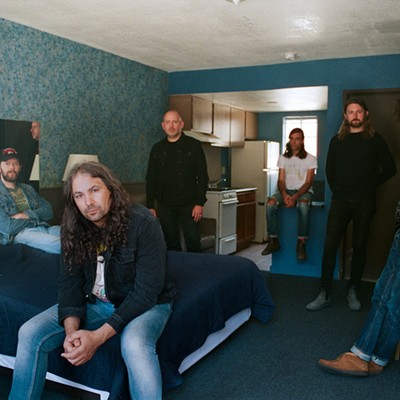
Late at night in a pool house studio, Jordan Richardson — the songwriter behind Son of Stan — would plug his electric guitar straight into a tape machine, foregoing amps so he could create a synthetic sound that reminded him of the desperation of ’80s suburban shopping malls.
“There’s just something about it. There’s something about this sort of bad lighting, storefront kind of shitty strip mall thing where ‘One More Night’ by Phil Collins just automatically hits you,” he said.
Though moonlighting as a poet of nostalgic doldrums, Richardson’s day job was as a successful drummer. He had drummed since he was three years old. He attended Texas Christian University on a music scholarship, where he both drummed and learned to produce music.
“The guy who owned the studio would kind of hand me the younger bands that he wasn’t interesting in doing,” he said. “But it was really good because that was the current stuff.”
In 2005, Richardson left his home state of Texas for Los Angeles. He moved with Oliver Future, the band he was drumming in at the time, to what he said “felt like a weird rock ’n’ roll boot camp.”
His rock ’n’ roll status would soon move up quite a few notches. He became the drummer for Ben Harper’s band, Relentless7, and even got the chance to play drums along the rock ’n’ roll drumming archetype himself, Ringo Starr.
His success didn’t stop there; a record he helped produce — Ben Harper and Charlie Musselwhite’s album Get Up! — won a Grammy for Best Blues Album in 2014.
But
Jordan still found himself spending late nights at producer Adam Lasus’
pool house, recording songs that he had written while touring all over
the world. Though he had made his living off drumming and producing, he
had been playing guitar and writing songs since about the sixth grade.
Now,
Richardson finds himself composing similar music to what he had
attempted to make as a frontman for a band in college, this time with
the knowledge and skill to pull it off.
“I’ve produced a lot of records since then, so I have a better handle on what I want to do, hear and feel,” he said.
The ability to feel nostalgia for desperate or painful times in our lives led Richardson to name his album the paradoxical Divorce Pop.
“It
just kind of seemed to have a double meaning, you know, leaving and
separating but also this sort of nostalgic feel that, for some reason, I
sort of relate to the idea of divorce,” he said. “I mean, I guess I
could have called it Shopping with Your Mom in 1986 Pop, but that didn’t ring as well.”










